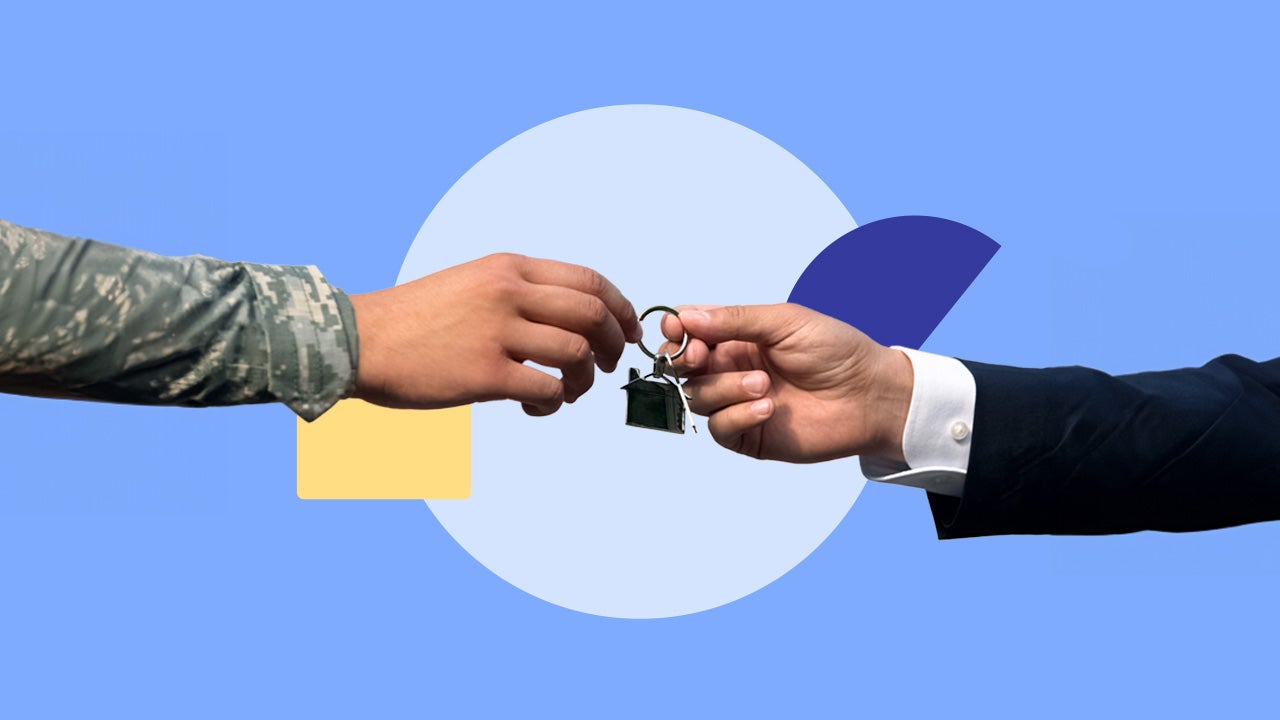What is a VA loan?

Key takeaways
- VA loans are mortgages guaranteed by the U.S. Department of Veterans Affairs, available to eligible veterans, active-duty service members and surviving spouses.
- VA loans can be used to purchase or build a primary residence, refinance a current mortgage or cover renovation costs.
- VA loans offer several benefits, including no required down payment in most cases, no mortgage insurance and often, competitive interest rates.
What is a VA loan?
A VA loan is a mortgage guaranteed by the U.S. Department of Veterans Affairs (VA), specifically for eligible active-duty military, veterans and surviving spouses. If you qualify, you can use the VA loan program to buy a home, build or renovate a home, or refinance an existing loan.
How does a VA loan work?
The VA doesn’t provide VA loans to borrowers directly. Instead, you’ll get your loan through a VA-approved mortgage lender. Many national banks offer VA loans, and there are lenders that specialize in them, too.
Like conventional loans, VA loans can have different term lengths — typically 10 to 30 years — and a fixed or adjustable rate.
In most cases, you won’t need to make a down payment to get a VA loan, and you won’t pay for mortgage insurance, either — a key difference between VA loans and conventional and FHA loans. However, you will be responsible for some upfront costs.
VA loan fees
VA loans do have closing costs, like other types of mortgages. In addition to the origination fee, the appraisal fee and others, they also charge the VA funding fee, which offsets lenders’ risk when providing no-down-payment mortgages.
The funding fee ranges from 0.5 percent to 3.3 percent of the loan amount, and it applies whether you’re buying or refinancing. For purchase loans, it costs:
| Down payment | First-time use | Subsequent use |
|---|---|---|
| 0%-5% | 2.15% | 3.30% |
| 5%-9.99% | 1.50% | 1.50% |
| 10% or more | 1.25% | 1.25% |
There are certain circumstances in which borrowers don’t have to pay the funding fee, primarily if they receive or are eligible to receive compensation for a disability caused by an injury suffered during service.
If you prefer not to pay the funding fee at closing, you can add it to your loan and pay it over time with your mortgage. That increases the total amount you’re borrowing and the total interest paid.
Current VA loan rates
VA loan rates are typically competitive with conventional loan rates, but they may be slightly higher or lower. For example, the national average rate for a 30-year VA loan is currently 7.08 percent, while the national average rate for a 30-year conventional loan is 6.88 percent.
VA loan eligibility and requirements
To be eligible for a VA loan, you need to meet minimum service requirements. These vary based on your status as active-duty or a veteran. There are also specific requirements for National Guard or Reserve members. If your spouse served, you might be eligible as well.
Before applying for a VA loan, you’ll need a certificate of eligibility, or COE, that proves you’ve satisfied the service requirements to qualify for the loan.
How to request a COE
Other VA loan requirements
Like other mortgages, VA loans have financial requirements — but they’re often more flexible than those of conventional loans.
- Minimum credit score: The VA doesn’t set a minimum credit score for its borrowers, but many lenders require a score of at least 620.
- Maximum debt-to-income (DTI) ratio: Borrowers must generally have a DTI ratio of 41 percent or less to qualify for a VA loan, but you may be approved with more debt if you have a lot of savings, a low tax burden or meet other special circumstances.
Lastly, you can only use a VA loan with a primary residence; investment properties and vacation homes aren’t allowed. The property also needs to meet certain safety and structural standards.
VA loan limits
If you have full entitlement, there’s no limit on the size of your VA loan. However, your lender still assesses what you qualify for based on your finances, including income and other debt. Your entitlement is pegged to conforming loan limits, as well.
You won’t have full entitlement if one or more of the following applies:
- You have an active VA loan that you’re still paying back.
- You paid a previous VA loan in full and still own the home.
- You refinanced your VA loan into a non-VA loan and still own the home.
- You experienced a short sale, deed-in-lieu of foreclosure or foreclosure on a previous VA loan and didn’t fully repay it.
In these cases, you’re restricted to borrowing only as much as the loan limit for your county.
For 2025, the limit in most counties is $806,500. In more expensive areas, that limit can go up to $1,209,750.
Help us shape the future of personal finance
We’re building something new to make rate shopping smarter and simpler. Join our waitlist to get early access, share your feedback, and unlock exclusive offers.
Priority rate alerts
Exclusive member offers
Time saving
Limited spots remaining
You're signed up!
Now, help us personalize your experience. Answering the next few questions will ensure you receive the most relevant tips and offers.
What are you looking for?
Tell us which products you are in the market for
What do you already have?
Tell us which products you already have
Tell us a bit more about you.
Are you a homeowner?
Tell us about your financial situation
What is your FICO credit score
One more thing
What is your annual income?
Stay tuned to see what we're building
You're all set! We're gearing up to share something big. You'll hear from us soon with what's next.
Types of VA home loans
Whether purchasing or building a home or refinancing a mortgage, there are a variety of VA loan options:
| VA purchase mortgage | For buying a home |
| VA construction loan | For building a home, including buying the land or lot, labor and materials |
| Interest Rate Reduction Refinance Loan (IRRRL) or VA streamline refinance | For refinancing to a new loan with a new interest rate and/or terms, with no appraisal or credit check required |
| VA rate-and-term refinance | For refinancing to a new loan with a new interest rate and/or terms |
| VA cash-out refinance | For refinancing to a new, larger loan with a new interest rate and/or terms, while taking cash out based on the home’s equity |
| VA rehab/renovation loan | For buying and fixing up a home |
| Native American Direct loan (NADL) | For Native American veterans to buy, build or fix up a home (or refinance a mortgage on a home) located on federal trust land |
VA home loan pros and cons
For those who are eligible, VA loans have many benefits, but they also have drawbacks to consider.
Pros of a VA loan
- No down payment: VA loans allow you to purchase a home with zero down payment. In contrast, you’d need at least 3 percent down for a conventional mortgage and at least 3.5 percent down for an FHA loan.
- No mortgage insurance: Unlike conventional and FHA loans, VA loans don’t require you to pay mortgage insurance, even if you aren’t making a down payment.
- Capped lender fees: The VA limits certain lender fees. This might mean lower closing costs compared to other loan types.
Cons of a VA loan
- Funding fee: VA loans charge a funding fee that varies depending on whether you’re buying a home or refinancing, whether you’re making a down payment — and how much — and whether you’ve previously used a VA loan.
- Limited to primary residences: You can only use VA loans to purchase a primary residence, not a rental or a vacation home. However, you can buy up to a four-unit property with a VA loan as long as one unit is your primary residence.
Is a VA loan right for you?
Even if your service qualifies you for a VA loan, you might decide to go with another loan type. For example, if you can afford to put 20 percent down on a conventional loan, you’ll likely pay fewer fees than if you chose a VA loan.
But a VA loan is likely the best option for you if:
- You’d struggle to qualify for a conventional loan. VA loans have more lenient qualifications than conventional loans.
- You live in a high-cost area. You can use a VA loan to buy a property that’s more expensive than conforming loan limits, potentially without a down payment.
- You plan to live in your home long term. Because of the upfront costs, it may not be worth buying a home with a VA loan if you plan to live there for only a few years.
How to apply for a VA loan
The process of applying for a VA loan is similar to that of applying for other types of mortgages. It involves comparing offers from lenders, providing proof of employment and income and promptly responding to underwriting requests. Here are the basic steps for a VA purchase mortgage:
- Obtain your COE.
- Organize a file of information about your finances, including recent pay stubs, bank and brokerage statements and tax returns.
- Compare rate offers from at least three VA lenders.
- Request a preapproval and begin looking for homes.
- Complete the mortgage application once you have an accepted offer.
- Be ready to provide additional credit or financial information as needed during underwriting.
FAQ
Why we ask for feedback Your feedback helps us improve our content and services. It takes less than a minute to complete.
Your responses are anonymous and will only be used for improving our website.












